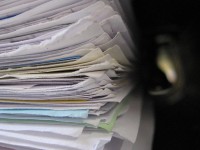One of my goals over the summer break was to tackle the chaos that had invaded our garage. One morning I finally took a deep breath and went in.
Trying to make sense of the utter clutter and chaos in the garage was pretty overwhelming so, I thought I’d begin with a ‘small’ task first. Yeah right! I opened up a filing cabinet that I had been using diligently for the last 5 years. Thinking that purging and organizing it should be a pretty manageable task. It contained many well marked folders with names like PGE, Utilities, 401, Bank of America, and Kids School. The folders seemed well organized but were bulging with papers. Looking at these fat folders, I kept thinking ‘ Do I really need all this paper.’ And… ‘If I need something in here… how in the world will I find it?’ Which actually brings me to the point of my initial rambling… most of the paper we collect we don’t really need and the ones that we need, we can probably just keep in electronic form. Mind you, there are some exceptions like Birth Certificates and Social Security Cards. But even those it is worthwhile to keep an electronic version as a backup.
I decided to create two piles, papers that I needed to save and papers to be shredded. Papers that I did not need or ones that I could get new copies of online went into the shred pile while the papers that had to be kept went into the save pile. I realized I could discard all the old utility bills, bank statements, phone bills and even the brokerage statements. Most companies save these bills online for quite a while. Phone companies and other utilities keep them for a year to 18 months, credit cards for five to seven years while most brokerage houses keep them for 10 years! Check with your bank, credit card company or brokerage to make sure they keep records for as long as you think you need them. In many cases you will find that they have electronic versions of all that paper you are holding on to.
As the hours progressed, I found that the shred pile grew while the pile containing important papers was barely there. Out went the old bills, mortgage statements, refinance papers (I kept the pay off statements from banks), papers from old jobs etc.
As part of this whole cleanup I also created a list of all the accounts that I had online access to and their login information. I ordered them by importance and made sure that their online access was working. Once I knew the accounts were working I decided to create a list of all the user ID’s and passwords and put them into an online tool that would keep them protected and accessible from anywhere. A simple way would be to do this by keeping a password protected file in your email. Another option is to use an online tool like Finovera which will keep your information protected but will also allow you to track the accounts. I chose to use Finovera as one of their features (that I really like) is that in addition to your various accounts like Credit Cards and Mortgage, they let you load important documents and maintain them in an online file cabinet.
Once my account information was organized and accessible not only to me but also to my husband, I felt a whole lot better. Now in an emergency we both have access to this information.
Getting all this done made me hungry and thirsty … so with a nice plate of cheese and crackers and a chilled can of coke … I got down to the serious job of shredding!

